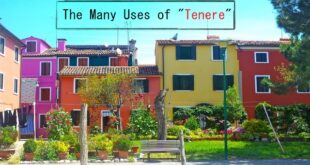Today in America, we “date,” “go out on a date,” or refer to two people who are “dating,” from the first romantic encounter until they become married. After marriage, a couple can still go out on “date nights.” But be careful when translating American romantic experiences into Italian! The English verb “to date” as used in America today to refer to a romantic relationship does not have a literal translation in Italian. Of course, “to court” a woman was common in past centuries, and the Italian language still reflects this. When a man tries to show he is interested in …
Read More »Impersonal Phrases with Italian Reflexive Verbs
Italian Reflexive Verbs Knowing how to use Italian reflexive verbs is extremely important for conversation, since Italian reflexive verbs often describe activities and emotions that are encountered every day. Reflexive verbs are recognized by the –si ending of their infinitive form. Let’s review a bit about reflexive verbs before going on to discuss how they are used to make impersonal statements. Direct reflexive verbs, as their name suggests, are used when an action refers back directly to the speaker in the subject of the sentence. For example, if one wants to describe the everyday act of falling asleep in Italian, …
Read More »The holidays in Italy
Christmas in Italy There are several important holidays that Italians celebrate during the Christmas season (periodo di Natale), which begins on December 8th with L’Immacolata and ends on January 6th with L’Epifania. The feast of Santa Lucia on December 13th is also an important holiday in northern Italy. This saint day is celebrated with candles, special pastries and presents for children who have been good during the year. See the table below for a list of the important celebrations that take place in Italy during the Christmas season and some common phrases that Italians use to wish each other “happy …
Read More »The Many Uses of “Tenere”
The Italian verb tenere has a wide range of meanings and its use lends a bit of sophistication to one’s Italian. It is important to “keep in mind” the nuances of the verb tenere to create sentences as we would in our native language. The Italian verb tenere is most often translated into English as “to hold” or “to keep.” It can be used in a simple way, to describe holding an object or holding another’s hand. As in English, the verb tenere can also mean “to hold,” with reference to capacity, as in how many objects or people can occupy …
Read More »Let’s talk about calcio!
Italy’s thrilling victory over England at the UEFA EURO 2020 soccer championship this past July sparked a week-long, country-wide celebration. Why not learn a few terms used to describe a sport that Italians are crazy about? Calcio, as the Italians call this popular sport, is derived from the verb calciare, which means “to kick.”If you’re in a soccer league here in the United States or you just like watching it at home, knowing a few Italian words and phrases will certainly add to the excitement of being involved in this Italian passion! Soccer — a brief history of the game …
Read More »“Missing you” with mancare
The verb mancare has many meanings: to miss/to lose/to lack/to be lacking/to omit/to fail. Perhaps the most common way to use mancare is to convey the idea of missing someone, so it is important to learn the conjugation and sentence structure for this verb for everyday speech. To start off, you should know that the sentence structure used for mancare is the same as for the verb piacere, the prototype for Italian verbs that only take an indirect object pronoun. You should also realize that this group of Italian verbs works differently from its English counterparts. Therefore, the English translation will not match the Italian …
Read More »He Said/She Said
Let’s begin our discussion of the important phrases “he said” and “she said” by looking at how to use the verb dire — to say — in the past tense. The past tense for “he said” and “she said” in Italian, a one-time event, uses the passato prossimo, and is “ lui/lei ha detto.” This Italian past tense verb also translates into the less commonly used English past tense, “he has said” and “she has said.” Since the subject pronoun is generally left out of an Italian sentence, we are left with “ha detto” to describe both what he said …
Read More »The Many Uses of “Riuscire”
The Italian verb riuscire has a wide range of meanings and its use lends a bit of sophistication to one’s Italian phrases. It’s important to learn the nuances of the verb to create sentences as we would in our native language. When linked by the conjunction a to another verb, riuscire means “to be able to” or “to manage to.” The meaning is similar to potere, with an important exception: riuscire lends a dimension of personal effort on the speaker’s part. Hence the translation into English as “to manage to.” In the negative sense, the use of riuscire a implies that …
Read More »Becoming Friends
How do we conjugate an Italian verb into the polite or familiar form? Let’s begin our discussion of polite and familiar expressions in Italian by talking a look at the conjugation table for chiamarsi, the reflexive verb that means “to be named,” or “to call oneself.” This verb is one of the first verbs an Italian student learns to conjugate and contains all the elements to understand polite and familiar verb tenses. First, let’s conjugate chiamarsi the way we would any other –are verb. Chiamarsi (to call oneself/to be named) will have the same stem and endings as chiamare (to …
Read More »As far as I know
As we’ve seen in a previous blog about the verb sapere,it is important to understand how to conjugate sapere in the present tense if one wants to describe what he or she knows. Sapere in the present tense is a verb of certainty; when one uses the Italian verb sapere, they do so to describe a fact or something they believe to be true. But there are times when you may not be certain if what you’re talking about is factual. To express doubt, possibility, uncertainty, personal feelings, desire or suggestions, Italian uses the subjunctive mood. And to convey uncertainty …
Read More » Fra Noi Embrace Your Inner Italian
Fra Noi Embrace Your Inner Italian











